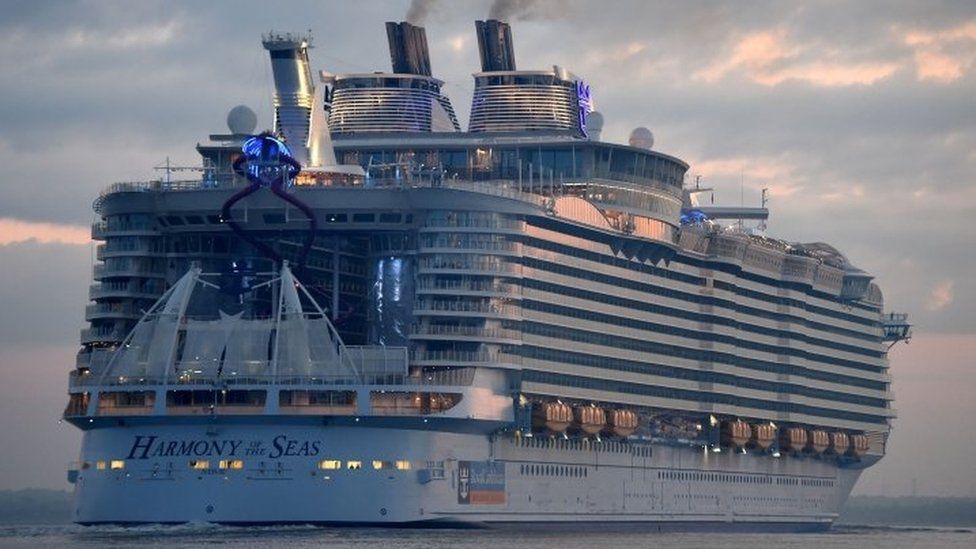Royal Caribbean: We expect all cruise guests to be vaccinated
One of the world's biggest cruise companies says coronavirus vaccinations will be needed to get on its ships.
Richard Fain, chief executive of Royal Caribbean, told the BBC "we expect all of our guests who are eligible for a vaccine to have it".
Cruising is a global industry that, before the pandemic, was worth $150bn and supported about 1.2 million jobs.
The US is the biggest market for the industry which has been almost completely closed down by the pandemic.
In 2019, of a record 29.7 million people who went on a cruise, 46.5% embarked at a US port
Safer than home?
Mr Fain is hopeful that customers will be encouraged to return soon by a range of new safety measures, including reduced capacity, social distancing and enhanced cleaning processes.
"The combination of the vaccines and testing and contact tracing, all these kinds of protocols really helps us reach our objective, which is to make cruising safer than in your home community".
"We want you to be more comfortable walking on board a ship than walking down Main Street."
The Centre for Disease Control (CDC), which is the US federal public health agency, has been working closely with the industry to restart sailings.
It stopped them in March last year after deadly outbreaks on ships such as the Grand Princess and the Diamond Princess made international headlines.
In the past few weeks the CDC has laid out detailed instructions on how cruise operators can hold trial runs to test their coronavirus protocols. Alternatively it says sailings can resume if 98% of crew and 95% of passengers are vaccinated.
In a statement, it said it was working towards "the prospective resumption of passenger operations in the United States by mid-summer".
It adds that the "CDC acknowledges that it is not possible for cruising to be a zero-risk activity for spread of Covid-19".
Virus risk
There have been outbreaks on some of the few cruises that have run around the world since the pandemic began. Royal Caribbean has hosted more than 150,000 passengers during the pandemic, and reported just 21 cases of coronavirus.
The sailings from locations including the Canary Islands, Germany and Singapore have all been "cruises to nowhere", meaning they do not stop at other ports.
However Mr Fain think this will soon change. "Ports around the world are opening up and opening up very quickly.
"That's actually that's a very important part of cruising , the opportunity to go other places".
Mr Fain concedes more cases could occur on cruise ships as things open up. "There will be cases of Covid-19 on board ships, just as there are cases of Covid-19 onshore". It's why, he says, procedures will be in place to isolate any passengers who show symptoms.
"If it happens on the ship... you'll be treated exactly the same as you are onshore, and that will protect from this becoming a bigger outbreak."
Outside of the CDC's remit, sailings from several Caribbean islands, Greece and within UK waters are due to put the new safety protocols through a sterner examination in the next few weeks. This will mean 13 of the company's 59 ships are in operation.
Financial drain
The lack of sailings means Royal Caribbean, which has about a 25% share of the global cruise market, has lost more than $6.8bn since the pandemic began. By contrast, the company reported a profit of $1.7bn in 2019.
It has also meant raising more than $12bn from investors to keep the company going. Rivals such as Carnival and Norwegian Cruise Line have felt similar financial pain.
"We think it's enough to see us through during these terrible times," says Mr Fain.
"I didn't like having to do it. But I was impressed at how quickly we're able to do it given a terrible market and a company with zero revenue."
Royal Caribbean senses financial improvements are on the horizon. Bookings are almost back to pre-pandemic levels with customers paying higher fares, something it says is a sign of strong long-term demand
Proof of vaccines
Mr Fain doesn't think that getting the industry fully up and running depends on the type of documents the airline industry is calling for.
"I don't think we're talking about a vaccine passport. I think we are talking about people who are vaccinated, and there are lots of different ways to show that".
He doesn't think that there are security issues around the paper documents issued to show vaccines have been given in countries such as the US and UK.
Asked about forgeries he replied: "We don't think many people would would even bother to do so."
"We've actually surveyed our guests and the vast bulk of the people that have booked our cruises have already been vaccinated, and they're volunteering it, they want it. And people want a place where they can go where they know they're safe."
https://www.bbc.com/news/business-57202890





Post a Comment